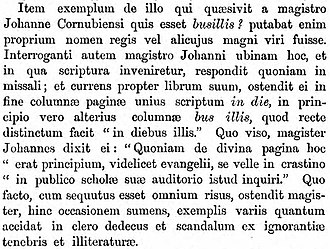John of Cornwall

“Another example (of the lack of Latin knowledge of the contemporary clergy ) is the theological student who asked his master John of Cornwall who Busillis was. He believed it was the name of a king or some other great man. When Johannes asked him in which book he had found the expression, he replied: In the missal. And he fetched the book and showed his master at the end of one column the words in and the word busillis at the beginning of the next - which results in correctly separated into diebus illis . When Master Johannes saw this, he said to him: Since the word comes from a holy page of a book, namely from the Gospel, I want to discuss it with my students tomorrow in a public lecture. He did so, and after everyone's laughter he seized the opportunity to show with further examples what shame and what annoyance the dark ignorance and illiteracy of the clergy caused. "
John Cornish , John Cornubiensis , Johannes de Sancto Germano , John of Cornwall , (* in the 12th century in St Germans , Cornwall ; bl. At 1176) was an English theologian of scholasticism .
Life
Information about Johannes' life can only be found in his remarks in the only written Eulogium ad Alexandrum Papam III that is certain to have come from him . be developed. Accordingly, he studied in Paris with Petrus Lombardus and Robert von Melun and then worked as a theological teacher himself. From Petrus Lombardus he took over a christological view, which he took at times, according to which the human nature of Christ is related to his divine nature like a garment to his wearer. This view was condemned as heresy at the Council of Tours in 1163 . As a result, Johannes moved away from her. In his to Alexander III. directed eulogium , he defends the orthodox position.
In the foreword to the Eulogium, he mentions Wilhelm von Blois as "former Archbishop of Sens , now Archbishop of Reims ". Since Wilhelm's change took place in 1176, the writing is dated to this year - provided that it is as close as possible to the council of 1163.
The poem Prophetia Merlini from the mid-12th century contains various references to Cornwall and is therefore attributed by some text scholars to John of Cornwall.
Giraldus Cambrensis (Gerald of Wales, 1146-1223), who has an anecdote from the teaching of John of Cornwall, was perhaps one of his students.
Fonts
- Eulogium ad Alexandrum Papam III. ( Digitized edition in Patrologia Latina Volume 199, Paris 1855)
literature
- E. Burton: Article John of Cornwall , Catholic Encyclopedia 1910
| personal data | |
|---|---|
| SURNAME | John of Cornwall |
| ALTERNATIVE NAMES | Johannes Cornubiensis; Johannes de Sancto Germano; John of Cornwall |
| BRIEF DESCRIPTION | English scholastic theologian |
| DATE OF BIRTH | 11th century |
| PLACE OF BIRTH | St Germans |
| DATE OF DEATH | after 1176 |